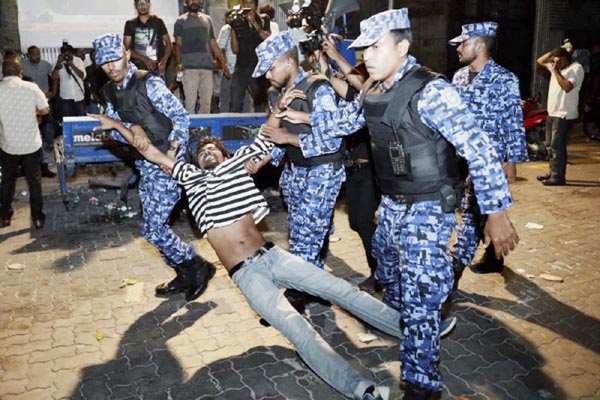
AP, New Delhi :
As a political crisis plays out in the Maldives, a quiet tug of war is taking place around it, with heavyweights China and India vying for strategic dominance in the picturesque Indian Ocean nation.
At first glance, Beijing and New Delhi want no part in the turmoil that erupted Feb. 1 when the Maldives’ Supreme Court overturned the convictions of several opposition politicians, including the president’s main rival. Chinese and Indian officials spoke in usual diplomatic tones, saying they have no interest in interfering in the archipelago’s internal affairs. But in reality, both have strategic regional interests to safeguard and are jostling for the upper hand.
President Yameen Abdul Gayoom has sent envoys to “friendly nations” China, Pakistan and Saudi Arabia to explain his government’s position since he rejected the court ruling, imposed a state of emergency last week and arrested two of the Supreme Court judges. His actions fueled suspicion that he has no intention of easing up on eliminating his rivals and tightening his hold on power ahead of this year’s elections.
His most powerful opponent, exiled former President Mohammed Nasheed, appealed to India to send troops to end the crisis.
“On behalf of Maldivian people we humbly request: 1. India to send envoy, backed by its military, to release judges & pol. Detainees … We request a physical presence,” Nasheed tweeted last week.
Traditionally, the archipelago of 1,200 islands and a population of 390,000 Sunni Muslims has been firmly in New Delhi’s sphere of influence, with India even intervening in 1988 when a group of mercenaries tried to seize power. Its support helped keep former strongman Maumoon Abdul Gayoom in power for three decades and later aided Nasheed, the country’s first democratically elected leader, who became famous when he used his low-lying island nation to highlight the risk of rising sea levels and climate change.
But the Maldives began tilting toward Beijing after Yameen, the half brother of Gayoom, came to power in 2013 by defeating Nasheed. Yameen has rolled back many of Nasheed’s democratic gains, with all of his potential political opponents either jailed or in exile. His government curbed freedom of speech and assembly, with heavy fines imposed on journalists and social media users found guilty of defamation. In 2015, in a trial widely criticized by rights groups, Nasheed was sentenced to 13 years in prison.
He later received asylum in Britain.
China saw the developments as an opening.
“Until 2011, China didn’t even have an embassy in the Maldives. Coming to 2018, it’s seen as a big player in this whole Indian Ocean region,” said Mahalakshmi Ganapathy, an India-China expert at Singapore’s S. Rajaratnam School of International Studies.
When Yameen visited Beijing in December, the two countries signed a free trade agreement that eliminates most tariffs on Maldivian exports, primarily fish, and opens the island nation to Chinese goods and services, including in finance, health care and tourism.
China is already the Maldives’ primary source of tourists, whose spending largely drives the economy, and Beijing is investing hundreds of millions of dollars in an airport expansion, housing development and other projects.

